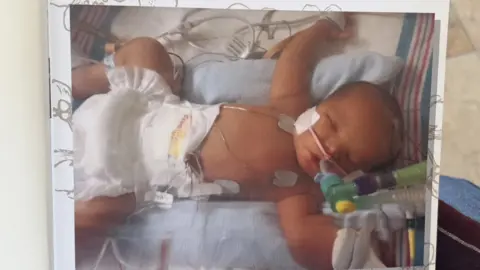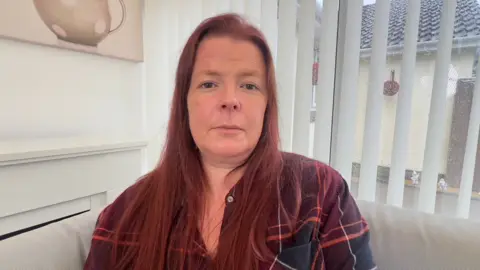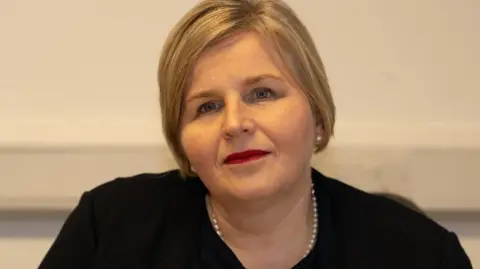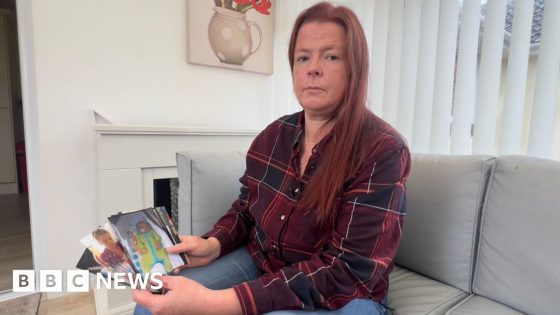 Rachel Kemble
Rachel KembleA mother whose son died three weeks after being born at a Swansea hospital has said he would still be alive if the care they received had been better.
Rachel Kemble’s son Farai was born by emergency Caesarean section at Singleton Hospital maternity unit in June 2013, but she said a failure to do an advised scan led to a lack of oxygen to his brain.
She is part of a group of families calling for a review of Swansea Bay University Health Board’s maternity services to be scrapped and restarted.
The health board said “no breach of care” was identified in Ms Kemble’s case and the Welsh government said it was “seeking assurance” that “meaningful engagement” with families would happen.
Dozens of Welsh parents spent years campaigning for a review into failings in the maternity unit.
But eight months after it was launched, they have said they feel ignored, with no one from the review having contacted them.
“It makes me sad, it makes me angry and I’m always sitting here thinking ‘what if’,” said Ms Kemble.
“In September he would have been starting comprehensive school. I’ve got five kids, but I’ve got four that are living and it’s just not right.”
When the 44-year-old from Swansea went to the hospital at 38 weeks pregnant, she was told she would get a scan to determine her baby’s position.
But the doctor who did her internal examination decided to proceed with her labour without the scan.
Two days later, she was rushed to have an emergency Caesarean due to a drop in her baby’s heartbeat – which showed up on a scan that also identified he was in the breech position, meaning he was lying bottom first, rather than head first.
She was later told the doctor had mistakenly felt her son’s bottom, but believed it to be his head, meaning the baby had spent two days not getting oxygen to his brain.
Farai took nearly two minutes to take his first breath and, in the special care baby unit, had several health complications including brain damage and epilepsy, requiring tubes for breathing and feeding.
“I never heard him cry,” said Ms Kemble.
“I believe if they had scanned me when they had started me off, they would have known he was breech and he’d still be here today.”
The family stayed at Tŷ Hafan in Barry, Vale of Glamorgan – a hospice charity for children – in the final days of Farai’s life.
But Ms Kemble said the full impact of the trauma they had experienced only hit about 18 months later.
“The first thing I did after I got back from Tŷ Hafan was I took his cot down. I did it on my own,” she said.
“I suffered PTSD, depression, anxiety. I still suffer today.
“I couldn’t be around babies or pregnant women for a while. I’m only now getting back on my feet after 11 years.”
She added all of her children needed counselling, but one of her daughters particularly suffered, not wanting to share her feelings in case she upset her mum.

Ms Kemble sought legal advice, but was told the hospital said she had been on a care plan – the regular procedure.
“But the care plan didn’t take place until they found out the baby was breech and the problem happened before that,” she said.
“The damage had already been done.”
She added: “The hospital just brushed it under the carpet, it was like he was just another number.”
Although she was unhappy with the hospital’s communication with her, she said the care her son received was excellent.
“I was getting given bits of information but I couldn’t put things together… I’d just come round from a C-section, I couldn’t think straight. I felt like I was a robot, just going through the motions.”
She said in the labour ward she “had to wait and wait” to be seen, but added: “My son was looked after lovely though, in the special care baby unit they made him feel comfortable, they made sure I was involved.”
She said some staff from the unit attended Farai’s funeral and wrote her a letter of condolence, but she “had nothing off the hospital itself”.
‘A bit of a scam’
Meeting other families with similar experiences was comforting, said Ms Kemble, but also heart-breaking.
“In a way I feel relieved because I can relate with some people and they can understand how I feel and we can talk,” she said.
“The pain stays with you for the rest of your life, but you just learn to live with it.
“But the main thing is Singleton Hospital needs to change. I just don’t want anybody else going through what I have.”
Rob and Sian Channon, whose son Gethin suffered a brain injury which left him quadriplegic, have been leading the families in the fight to get their stories heard, and described the review process as “a bit of a scam”.
“Not a single family from our group has been contacted to have their case looked at,” said Mr Channon.
“[We] have been completely shut out.”
Margaret Bowron KC, who was chairing the review, stood down in June following criticism.
She was replaced by interim chairwoman, Dr Denise Chaffe, who apologised for the delays and insisted there was a “determination to move forward” and to “work closely with families”.
 Donna Ockenden
Donna OckendenDonna Ockenden, chairwoman of two of the NHS’s biggest maternity reviews, said listening to families was the “only way forward”.
“The accounts from these families are deeply distressing,” she said.
She said a “very large number of health boards” were struggling with maternity resources.
“I think that when something goes wrong, as it clearly has at Swansea Bay, the very first step should be to engage families in the process.
“The families have clearly articulated that they do not have any confidence whatsoever in this current review.”
She added there was precedent for failing reviews to be closed, and backed the families’ calls for this to happen.
Swansea Bay health board said it had investigated and provided “a comprehensive response” when contacted by Ms Kemble’s solicitor and “no breach of care was identified”.
It added: “We understand the families’ strength of feeling, and we all want the same outcome – to have a maternity and neonatal service which is the best it can be.
“The review is now under way, with letters to be issued to families shortly inviting them to come forward to give their views.”
The Welsh government said it would be “seeking ongoing assurance that the health board is constructively supporting the review process and robustly responding to any emerging concerns and learning as a priority”.
“It is essential that this review has meaningful engagement with families and staff,” it said.
Speaking to Radio Wales Breakfast, First Minister Eluned Morgan said she had written to the health board “to require them to make sure that they do involve the families”, but she thought it was “important we allow that system to run”.
Source Agencies





